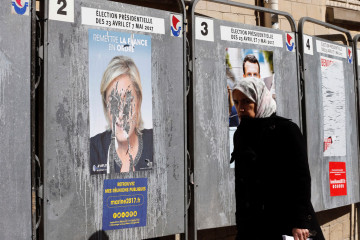

Passers by looked particularly happy in Seine-Saint-Denis, one of France’s poorest departments after a surprising twist in the run-off elections organised on July 7.
In Les Lilas, a traditionally left-wing city where diverse communities live together, the day of the results was marked by relief after the announcement.
“The whole world was worried for us,” says Kouame, a 34-year-old man of Ivorian descent who works in a fast-food restaurant.
“I had voted for Macron in 2017, but now I voted for the left for the two rounds. I am very happy with the result,” he said.
Sanaa, a 42-year-old seller of Moroccan descent working on the same street, says she has never seen “such a mobilisation for the left” since she immigrated to France ten years ago.
“My whole family, including my uncle who is 82 years old, headed to the polls. Even my niece, who is usually lazy, went as well,” she said jokingly.
The woman, who works in a Jewish bakery, said that she was particularly “worried about the measures concerning dual-nationality holders.”
“I wanted to apply for French citizenship, but the measures of the National Rally made me worried that they would one day ask me to renounce my Moroccan nationality, and I would never do that,” she said.
Despite the result of the New Popular Front, which secured 188 seats in the parliament, Sanaa is still worried by the score of the National Rally, which came third in the run-off elections, winning 142 seats.
“I have been seeing the rise of anti-Muslim racism here in France. People are more and more divided, and you can feel it everywhere: walking around, taking public transportation…”
“Some French people blame all their problems on immigrants, and this is not fair,” she told The New Arab.
A ‘half-hearted’ victory
In Ivry-Sur-Seine, a suburb southeast of Paris, Assia, a 25-year-old student of Algerian descent, has been particularly mobilised between the two rounds of the snap elections.
She notably went canvassing almost every day in districts where the left was running, to try to convince electors to side with the New Popular Front.
“It is a half-hearted victory, as there are still more than 10 million people who voted for the National Rally,” Assia told The New Arab.
“What I saw on the field is that many people support the National Rally out of a desire to see some ‘change’ in the country,” she continued.
“What we are expecting from the left now is that they don't betray us. We don’t want to see them collaborate with Macron’s centrist coalition, nor with the far-right.”
Indeed, growing fears that the country will be “ungovernable” are rising, as none of the parties succeeded in securing the 289 seats necessary to have a majority in parliament.
Jean-Luc Mélenchon, the leader of France Unbowed, the left-wing party which won the largest number of seats in parliament, stated in a speech on Sunday night that France will have “a Prime Minister from the New Popular Front.”
Emmanuel Macron, who had called for these snap elections, has since then contested the results, stating that “no one has won”, as no party succeeded in reaching a majority.
For Sarah Ichou, the editor-in-chief of Le Bondy Blog, a news outlet whose goal is to give a platform to the inhabitants of the French underprivileged suburbs, the left-wing coalition’s victory was a question of “survival” for many in the immigrant communities.
“Concretely, our lives would have been put into question, with measures targeting us, people of colour, who have immigration backgrounds,” Ichou said to The New Arab.
“Finding a job, finding housing, going to school, all of those things could have been compromised for our people under the National Rally,” she continued, referring to the “national preference” the party wanted to put into place in the housing, health and jobs areas.
“The left wing owes a lot to the mobilisation of the working-class districts. People in the suburbs have already been disappointed by the left a couple of years ago, and they had to put their pride aside to vote for them again”, Ichou emphasised.
“Inhabitants of those neighbourhoods expect a lot from the left-wing now, and as they have been there to make them win, they will be there to keep them accountable,” the journalist concluded.
In Seine-Saint-Denis, where the abstention rate is usually one of the highest in France, 60.6% of the electorate headed to the polls during the first round of the elections, an increase of 13% compared to 2022.
In a pharmacy in Belleville, another multicultural neighbourhood of Paris, Mamadou, a security agent of Senegalese descent, wasn’t able to vote either, as he hasn’t yet been granted French citizenship.
“But if I could have, I would have voted for the New Popular Front without hesitating!” he says.
Among the measures of the left-wing coalition he particularly liked, he cites the rise of the minimum wage to 1600 euros, as well as the lowering of the retirement age to 60 years old.
“I was scared that a civil war would erupt if the National Rally won: everyone was very tense, and when we heard the results, some people were jubilant in the streets.”
He recalls how, on the night of the final results of the elections, strangers were congratulating each other, saying “We have won! We have won!”
“It is a beautiful moment for France, let’s hope it stays like this,” Mamadou concluded.
Sania Mahyou is a Belgian-Moroccan freelance journalist and a student at Sciences Po Paris. She writes about political struggles, culture and minority rights in the MENA region
Follow her on Twitter: @MahyouSania




 Follow the Middle East's top stories in English at The New Arab on Google News
Follow the Middle East's top stories in English at The New Arab on Google News


